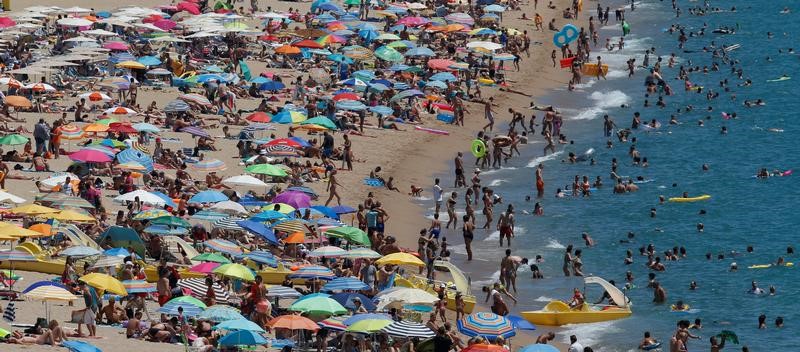By Geoffrey Smith
Investing.com -- The U.K.’s decision to impose a two-week quarantine on travelers returning from Spain has put a chill on European stock markets Monday, puncturing assumptions that Europe would avoid a second wave of the coronavirus and casting doubt over their ability to outperform U.S. stocks for once.
Predictably, travel stocks have been the worst affected, with tour operator Tui (DE:TUIGn) stock falling 12.8%, U.K. rival Dart Group Plc (LON:DTG) (owner of Jet2) falling 11.3% and EasyJet PLC (LON:EZJ) stock falling 10.5%.
Spanish hotel operator Melia Hotels (MC:MEL) stock fell 7.4%, while Swiss-listed Dufry AG (SIX:DUFN) stock fell 6.0% as the market digested the risk of another hit to business at its duty-free shops.
Beyond the sectors directly affected by travel, Spanish bank stocks also retreated sharply, with Sabadell (MC:SABE) stock and Bankia SA (MC:BKIA) stock falling 4.6% and 3.7%, respectively. Caixabank, BBVA (MC:BBVA) and Santander (MC:SAN) were also down by more than 2% each.
The moves, which pushed the IBEX 35 index down 1.5% and contributed to a 0.4% drop in the Stoxx 600, underline how closely market performance is tied to the actual state of the medical emergency, which - until a fully effective vaccine is widely distributed - is the overriding factor determining the health of the economy.
Spain was one of the countries worst hit by the first wave of the virus, imposing one of the tightest lockdown regimes in all of Europe with - eventually - clear success. However, the importance of the tourism sector to the economy left officials with little choice but to reopen before the summer, and that has allowed the virus to regain momentum. The rate of new infections has tripled since June, with several new hotspots linked to bars and other places of social gatherings. The economically vital region of Catalonia closed all bars, clubs and indoor restaurants on Friday.
The surge isn’t limited to Spain. Countries as diverse as Belgium and Poland have also been registering increases in new infections in recent days. Across the continent, localized flare-ups in meat processing plants and other workplaces where social distancing is difficult are appearing with increased frequency, raising regular challenges to virus containment at national level.
Last week’s purchasing managers’ indices from IHS Markit suggested that there had been no visible impact on business confidence from the emerging signs of a second wave. The Eurozone composite PMI showed the economy returning to growth, with its highest reading since July 2018.
That pattern was – sort of - reinforced on Monday by Germany’s most accurate confidence survey, published by the research institute Ifo. Ifo’s business climate index rose to 90.3 in July from 86.3 in June, a little more than expected. However, while it’s relatively easier to check a box that says things will be better in six months’ time, it was notable that the ‘current conditions’ sub-index improved by less than expected and was still at a level near the worst of the 2008/2009 crisis. Things may be getting better, but they are doing so slowly, and taking one step back for every two steps forward.
